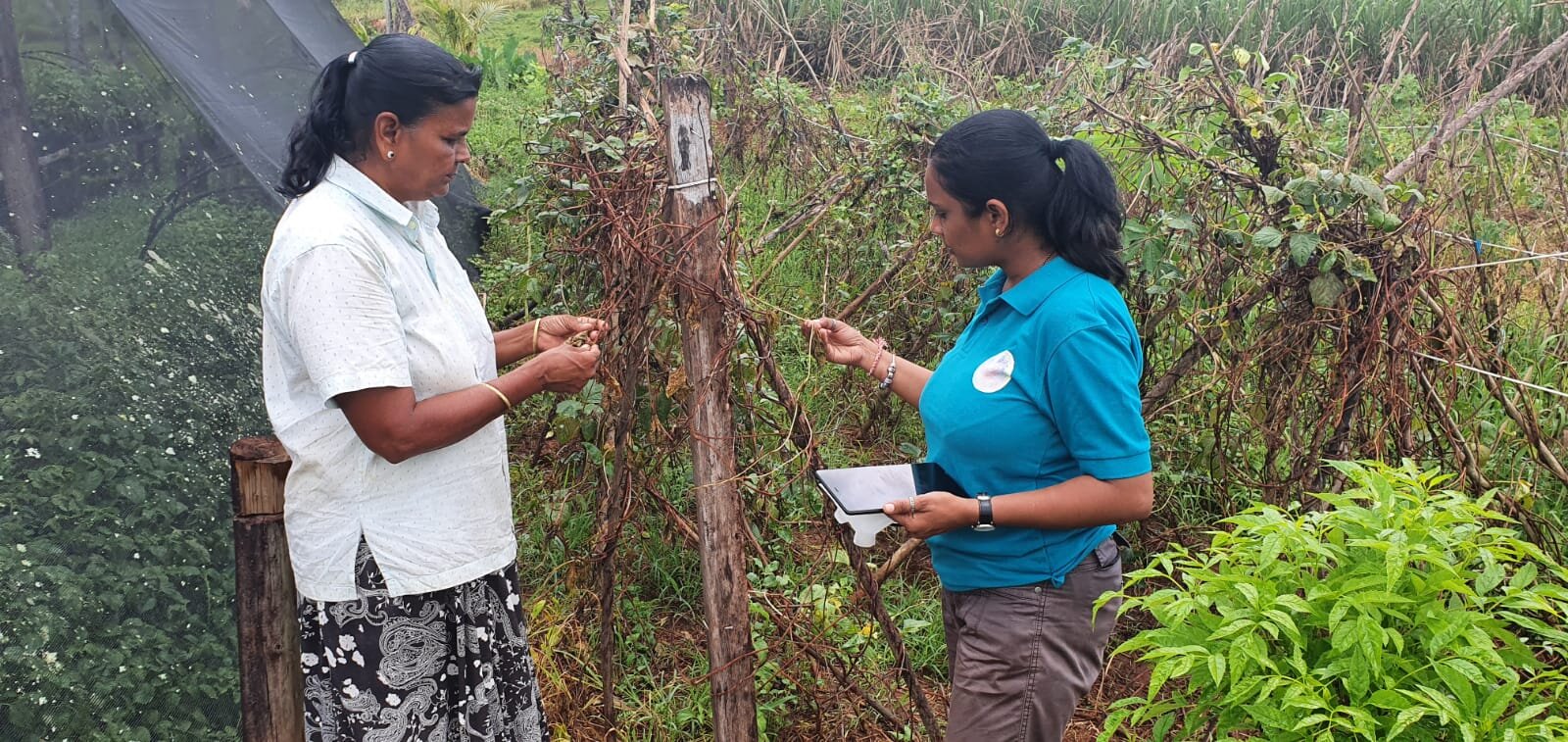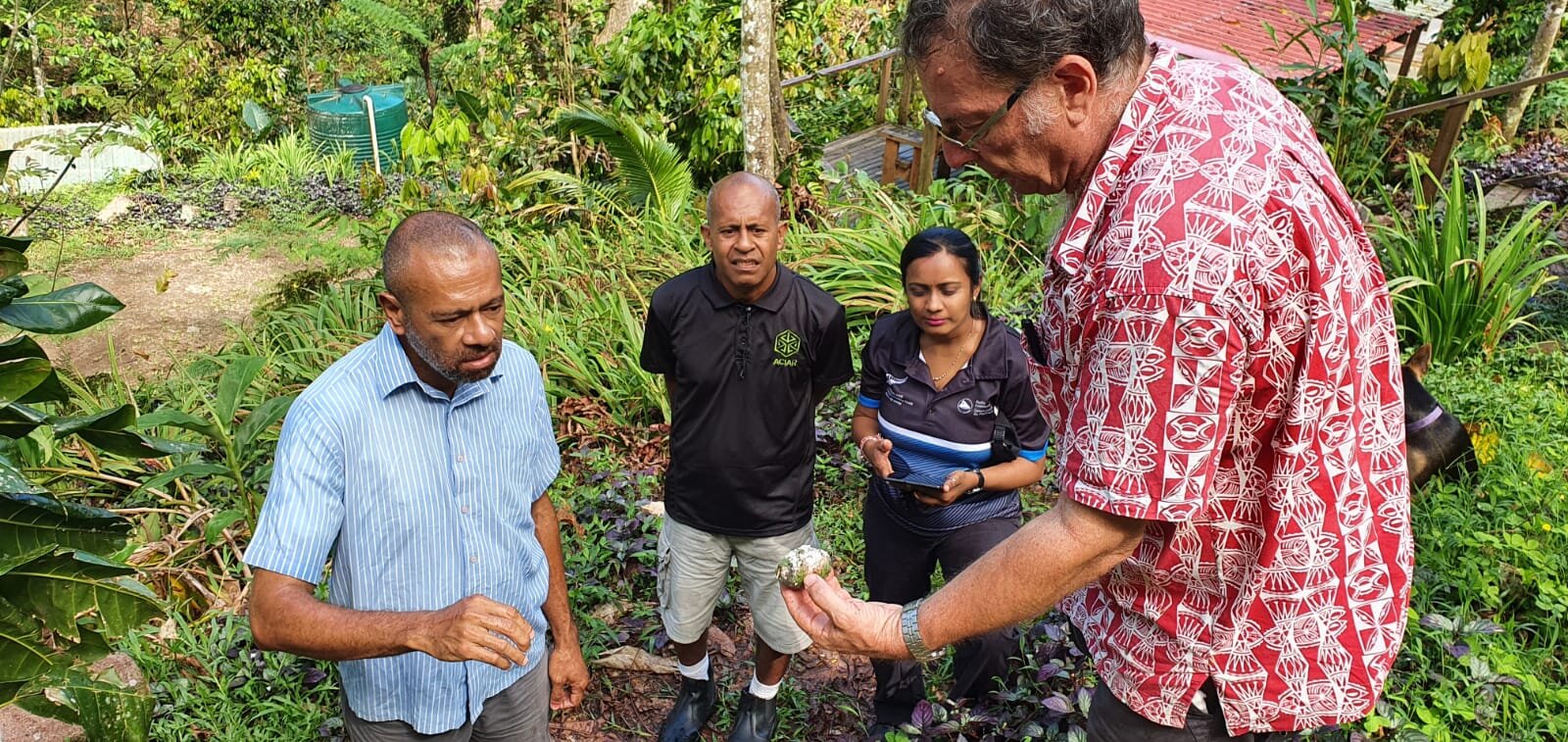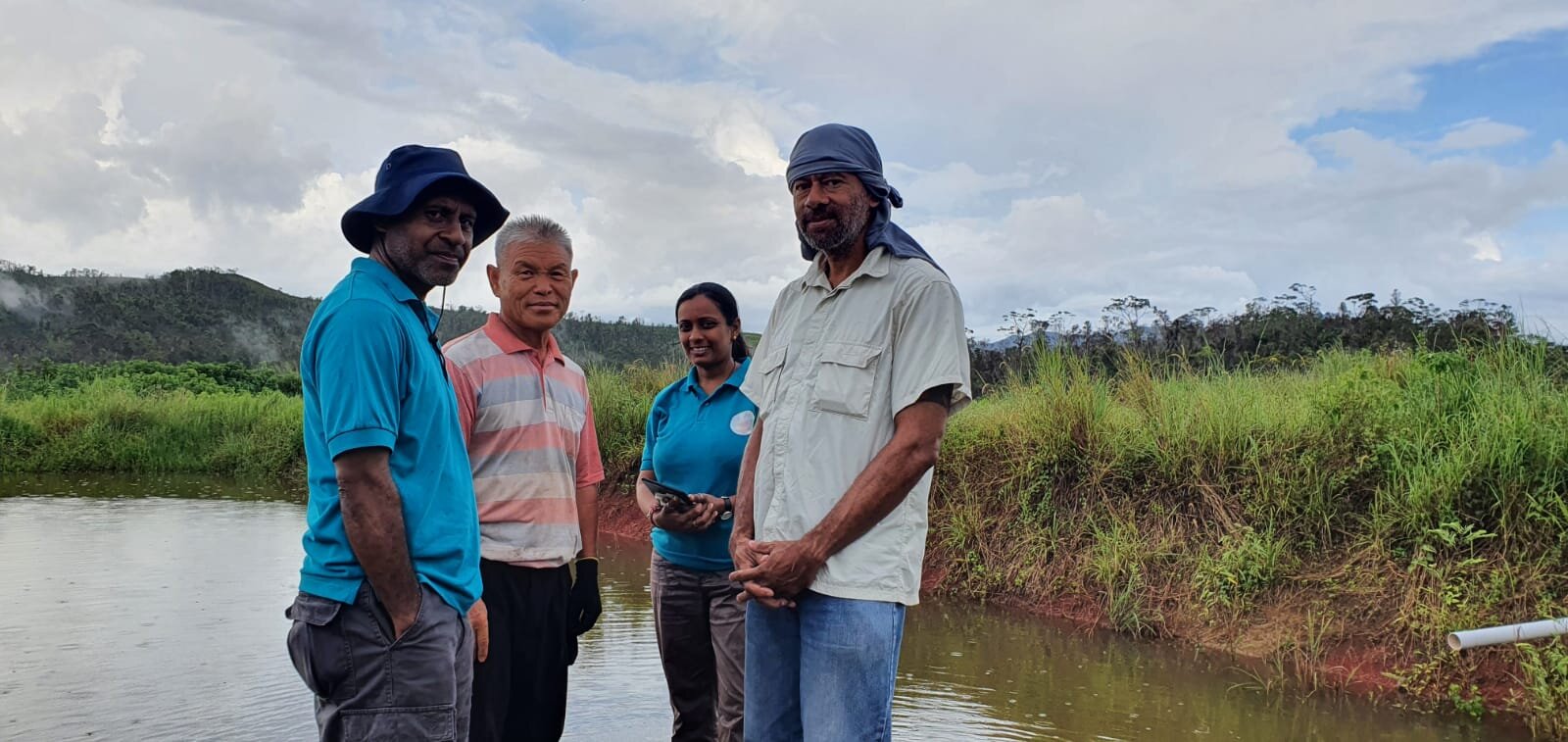Leaving no stone unturned
Forty-three women across the Indo-Pacific are now members of the supportive Meryl Williams Fellowship network that is cementing gender equity as a cornerstone of productive and sustainable agricultural systems. Charismatic and thoughtful Aradhana Deesh is one of them.
"You have to stay humble, keep trying and never lose hope. I try to be an agent for change and, if I receive criticisms, I reflect on them and use them as stepping stones."
Aradhana at the University of New England, Armidale Australia during the first immersive workshop of the Meryl Williams Fellowship, January 2020.
Inspiring Fijian agricultural researcher and Meryl Williams Fellow Aradhana Deesh exudes positivity from every pore. It's little wonder her influence and enthusiasm is now rippling out across the Pacific.
"I am a person who will not let an opportunity go," she says. "Every opportunity is a chance to up-skill, broaden my knowledge horizons or to learn more about myself. If one opportunity comes my way, I try to make the most of it."
Indeed, in the 15 months since being named one of the 19 inaugural fellows, Aradhana has embraced a number of significant opportunities to advance her research, Fijian agriculture and her own personal development. The benefits continue to be far-reaching - in her workplace, community and family.
Not even worldwide travel restrictions have prevented Aradhana from establishing a landmark Ministry of Agriculture nursery in Koronivia for the development of biological agents for weed control, where she will foster scientific collaboration and further her training. In the midst of the COVID-19 pandemic, Aradhana also received ACIAR Alumni Research Support Facility (ARSF) project funding to evaluate the success of home gardens.




In response to COVID-19, the Fijian Government pledged $1 million to enable the Ministry of Agriculture to develop programs to help bolster food security. One such program was the distribution of 36,500 seed packages to urban households, with the aim of engaging women and young people in home gardening, and Aradhana will be evaluating the success of the initiative, as well as supporting gardeners with scientific advice.
And the enterprising research officer within the Ministry's Plant Protection Unit traces much of her new research activity and personal ambition to one decision; one application; one confident act.
"It was a dream of mine to become connected with the ACIAR (which funds the Meryl Williams Fellowships administered by the University of New England, Australia)," Aradhana says. "This prestigious fellowship has played a significant role in giving my research recognition at regional and international levels, and opening gateways to research collaboration. I'm really excited that my vision to revive the weed bio-control program in Fiji, to reduce the impact of weeds on agricultural production systems here and elsewhere, is being supported by an international organisation of this calibre. None of this would have been possible had I not taken the decision to apply for the Meryl Williams Fellowship."
An only child, Aradhana grew up on Fiji's second main island, Vanua Levu, and was denied the chance to study agriculture at high school because of her gender. A government scholarship did, however, enable her to study biology and chemistry at university, and she accepted a research role at the Ministry of Agriculture 12 years ago, possessing strong technical skills but limited knowledge of agriculture.
"Since agriculture was a new career field for me, I concentrated on improving my agricultural research skills to meet research outputs," says Aradhana, who went on to complete postgraduate and Masters study. "Culturally, men have been seen as the good leaders in Fiji. I thought the male-dominated mindset and organisational operations within the ministry were normal, until I took up the Meryl Williams Fellowship."
Immersing herself in the executive leadership program of workshops, mentoring, network building and professional development has given Aradhana a very different perspective.
"I came to realise that men and women have different needs and both genders need to be represented at decision-making levels," she says. "It was something I had never considered. I learnt that a person's most important ability is their willingness to make a difference and that it is critical that the voices of women are heard.
"Female innovators are inspirational and motivational to other women; they encourage them to dream big and to work towards achieving their dreams and the success they rightly deserve. I try through my actions and attitude to change the mindset of other women, so they feel able to adopt positive change, too. We need women to serve as role models, to show the way forward for other women who might not be so privileged."
After returning from her Meryl Williams Fellowship training in Australia, Aradhana moved quickly to implement what she had learned. Equipped with a new-found understanding of her personal values, leadership style and the qualities needed to be an effective leader, she set about encouraging bold new gender discussions and advocating for gender awareness and respect. She also sought to make the most of the networks that were developing with other fellows.
"When you talk about gender, there is a common misconception that women are trying to do something against men and competing with them," she says. "But gender discussions are not just about women. Everyone has hidden potential. The Meryl Williams Fellowship helps participants to tap into that potential, for the fellows to understand their capabilities and potential, and to recognise that if they have ability, they should be encouraged and supported.
"No-one who is progressing, male or female, should be seen as a threat. Instead, we need to see each other as role models and possible mentors. I try to always lift people rather than suppress them. It can be challenging at times with men, but I do my best to help them to realise that I still have respect for them and that we share common targets to achieve. We need each other's support along the way.
"I've seen positive changes in myself, particularly in how I interact with people from different backgrounds. I have acquired the skills to deal with people, while still being considerate of their special needs, beliefs and ethnicity."
Topics that were rarely raised before are now routinely discussed within Aradhana's workplace. She has even been developing an online gender presentation for in-house training across Fiji's agricultural stations and is keen to expand this program and introduce a supporting manual.
Aradhana presenting her learnings on gender equity to the Human Resources team at the Ministry of Agriculture, Fiji.
"We would never speak about gender before," Aradhana says. "Now we're celebrating International Women's Day, we're talking about the bigger-picture things we need to do through our policies, procedures and funding to address the needs of different groups within our institutions."
It's happening in concert with broader reform, too, with the Fijian Government piloting gender-responsive budgets in nine of its ministries, devoting resources specifically to women's programs and staff empowerment.
Not surprisingly, given her humility and good grace, Aradhana has found herself emerging as a powerful example to other women, and men, which she says gives her "a great deal of inner satisfaction and happiness". "What I have learnt from the fellowship mentors, facilitators and other fellows I can use in my own context and to test my own abilities," she says. "The fellows may live in very different countries, but we face similar challenges and there are similarities in how we can address gender issues and bring about change, wherever we live."
In the scientific realm, Aradhana is pioneering change of a different kind. Her research focuses on tropical weed management, particularly reviving weed bio-control as a cost-effective and environmentally friendly method of managing weeds in Fiji. Before the global pandemic, she had been due, as part of her Meryl Williams Fellowship, to visit Biosecurity Queensland, within the Department of Agriculture and Fisheries (QDAF) in Brisbane, Australia, to spend time with her mentor Dr Michael Day, the principal QDAF entomologist. However, when COVID-19 travel bans put paid to those plans, Aradhana pivoted to focus on research closer to home, with Dr Day offering advice remotely.
"With my team, I continued improving our weed bio-control program and through this collaboration with Dr Day we recently had the opportunity to network with members of the Natural Enemies – Natural Solutions (NENS) program, a regional program of the Pacific Regional Invasive Species Management Support Services (PRISMSS)," Aradhana says. "We participated in virtual training conducted by facilitators from Manaaki Whenua – Landcare Research (MWLR), based in New Zealand, and Queensland Department of Agriculture and Fisheries (QDAF) staff in Australia.
"By networking with experts and setting up the nursery, we can rear different bio-control agents on specific host plants. This could potentially allow us to mass-produce bio-control agents for local use and supply them to other Pacific Island countries, too.
"I consider myself lucky to have brilliant mentorship from QDAF and MWLR. Staff have been able to support and inspire me to continue my research remotely and innovatively, and I look forward to going back and sharing my findings with them. I am honoured to be part of the Meryl Williams Fellowship and I hope to inspire other Pacific women to turn similar challenges into opportunities."
That determination to set a good example extends naturally to Aradhana's own family, where she and her husband are guiding their 12-year-old daughter Avantika to explore leadership opportunities at school. After serving a year as a prefect, Avantika was considering stepping back to concentrate on her studies, but her mother had some sage words of advice.
"I sat with her and listened to her, and told her that there will be challenges," Aradhana says. "I told her that being a female leader is not easy, but that if she was lucky enough to have the chance to take up a leadership position at such a young age and she rejected it, she may regret that decision later."
Aradhana says such conversations are reminiscent of those she had with her own mother, who she cites as her "number one mentor". "My mother faced a lot of challenges growing up as a girl, with a lot of siblings, a poor standard of living and few resources," Aradhana says. "She didn't receive a proper education herself, because the mindset at the time was that girls should not gain higher education, but she always maintained a vision for me to achieve the things she didn't. I am so thankful for that.
"My mother taught me that not all change has to be big; making small changes in the lives of others adds up to something big. Being part of the Meryl Williams Fellowship program reminds me that anyone can be a good leader, if you have the eagerness. It's about understanding who you are and showing the way forward."
Aradhana (right) with daughter Avantika Chand.
Written by Amanda Burdon
Aradhana Deesh was awarded a prestigious Meryl Williams Fellowship in 2019. The Meryl Williams Fellowship is funded by the Australian Centre for International Agricultural Research (ACIAR) and supports female agricultural researchers across the Indo-Pacific to improve their leadership and management skills.
The Fellowship contributes to more secure food systems by providing women in agricultural science with greater access to resources and decision making, building collaborative networks, supporting career advancement and driving institutional progress towards gender equity. Learn more about the fellowship at https://www.geared.global/aboutmwf



